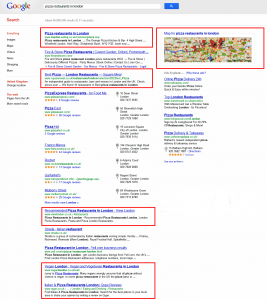Don’t Be Surprised By the Success of Review Websites
 Nielsen recently published findings from its Global Trust in Advertising survey and the headline finding was ‘online reviews and personal recommendations are the most trusted form of ‘advertising’.
Nielsen recently published findings from its Global Trust in Advertising survey and the headline finding was ‘online reviews and personal recommendations are the most trusted form of ‘advertising’.
Regardless of the philosophical argument about whether or not Word of Mouth (WOM) can be classified as paid media, it comes as no surprise to see review websites, essentially posts by ‘people like me’ are again amongst the most trusted sources of information.
Yelp, Google Places and Qype are virtually omnipresent within certain types of search results and whatever you are looking for; from holidays to cars to PCs, there’s going to be a review site for that niche. In fact, every time you search for a product, service or experience, numerous reviews and a map will be included (see below for example).
The reason being is that Google understand people search for two things; information and opinion. People want answers to factual questions, such as location, opening hours and price, but they are also looking for subjective answers and opinions on the product quality, service and atmosphere to guide their decision.
Quickly providing users with links to quality information and genuine opinion are a fundamental part of Google’s success, but it has dramatically increased the prominence of review websites. They have been elevated to a place of authority, truth and authenticity.
However, this elevation alone does not explain the success of review websites. Instead, we need to look at human behaviour and recently, I stumbled across a behavioural model called the Four Human Core Drives by Harvard Business School Professors Paul Lawrence and Nitin Nohria.
The premise of the Four Human Core Drives is quite simply the more human core drives your offering has, the more appealing it will be. It is made up of the following drives:
- Acquire
- Bond
- Learn
- Defend
Marketers are well acquainted with communications models, but we should not be afraid to borrow and adapt models from wider disciplines, and the thinking behind the Four Human Core Drives model was that it would be applied to products. However, I’ve used the word ‘offering’ as I think the model works equally well when used in the context of community management, blogs and apps.
Indeed, when you critically evaluate review websites against the Four Human Core Drives you’ll see that most encompass three of the four drives.
Review websites typically enable participants to gain status and influence by offering their views (acquire), feel a sense of community by interacting (bond) and many people frequently return to find out new information and satisfy their curiosity (learn).
I’m yet to find a review website that enables people to defend (in the truest sense of the word), but encompassing three out of four core drives is hugely important and offers the clearest explanation as to why review websites are so popular, trusted, engaging and influential.
Google














